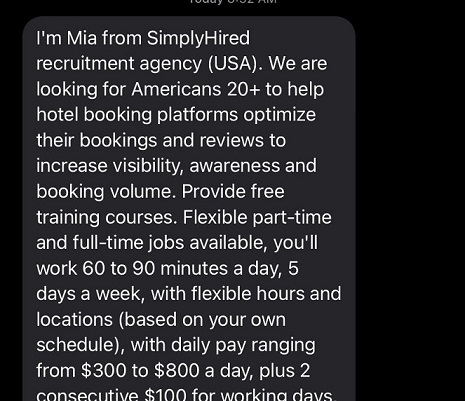A sophisticated scam operation impersonating the job search platform SimplyHired has targeted thousands of job seekers worldwide, promising extraordinary pay for minimal work while ultimately aiming to extract money from victims. The widespread fraud scheme, which has operated for at least two years across multiple continents, follows a consistent pattern of unsolicited WhatsApp, Telegram and text messages, unrealistic job offers, and eventual requests for payments.
This investigation reveals how the scam operates, the red flags to watch for, and how legitimate job seekers can protect themselves from falling victim to increasingly sophisticated recruitment frauds.
Overview of the SimplyHired Text Scam
The scam begins with an unsolicited text message or WhatsApp communication from someone claiming to be a recruiter from SimplyHired, a legitimate job search platform. “Winnie,” “Mia,” “Anna,” “Tina,” and “Darlene” are common names used by these purported recruiters, who claim that the recipient’s “resume has been recommended by several online recruiters.”
The scam text typically promises extraordinary compensation—ranging from $200 to $900 per day—for minimal work, usually described as “60-90 minutes daily” with “flexible hours” and “same-day payment.” The job descriptions are intentionally vague, often mentioning tasks related to “hotel booking platforms,” “merchant data,” or simply “online work.”
Example of the Fake hiring text looks like:

I’m Mia from Simply Hired recruitment agency (USA). We are looking for Americans 20+ to help hotel booking platforms optimize their bookings and reviews to increase visibility, awareness and booking volume. Provide free training courses. Flexible part-time and full-time jobs available, you’ll work 60 to 90 minutes a day, 5 days a week, with flexible hours and locations (based on your own schedule), with daily pay ranging from $300 to $800 a day, plus 2 consecutive $100 for working days.
According to Jacob Hartwell, who reported the scam to his state attorney general in March 2025, “This is a scam company that contacts individuals on their private devices advertising jobs that do not exist and were not asked for.”
One consistent element across nearly all reports is the request to continue communication via WhatsApp—a common tactic used by international scammers to move conversations off traditional channels where they might face more scrutiny.
Multiple Variations, One End Goal: Financial Exploitation
While the initial approach remains consistent, the scam evolves along several different pathways, all leading to financial exploitation:
1. The Task Scam Progression
The most common evolution is what’s known as a “task scam.” Victims are directed to download an app or visit a website where they complete simple “tasks” supposedly for payment. The scammers initially provide small payments to build trust.
As one victim reported on Reddit: “I continued further than you and they kept asking for money to complete tasks. I ended up not losing anything. But… they were getting me ready. I did send money, $30 bucks, then I got it back plus $30. And then later on they asked for $100.”
The catch comes when victims attempt to withdraw their “earnings.” The system requires them to “upgrade” their account by paying a fee, but no matter how much money is invested, withdrawals are never possible because the earnings aren’t real.
2. The DataDog Cryptocurrency Variation
A more elaborate version of the scam involves the creation of accounts on DataDog (a legitimate cloud monitoring service) or a fraudulent lookalike site. Victims are guided through a complex process involving cryptocurrency transactions.
One victim described losing $1,500 through this method: “I was taught how to navigate and make money on a likely fake but very real-looking datadog website, and an app for trading crypto called Lbank… They finally caught me with a ‘combo’ task that overdrew my account by like $1,100 dollars.”
The scam employs sophisticated psychological tactics, creating the illusion of success before introducing larger “investment” requirements, with promised commissions that are never attainable.
Fake SimplyHired Whatsapp and Text Message Patterns
The text messages follow remarkably consistent patterns that exploit psychological vulnerabilities:
- False exclusivity: “Your resume has been recommended by several recruiters”
- Unrealistic rewards: “$300-$800 per day” for “60-90 minutes of work”
- Artificial urgency: Limited-time opportunities that require immediate response
- Minimal qualifications: Age requirements (typically 22+ or 25+) as the only barrier to entry
- False legitimacy: Associating with known brands like SimplyHired, DataDog, or Expedia
When recipients express skepticism, the scammers employ additional tactics:
- Asking “Why not just take a look?”
- Claiming “Many people are already succeeding” (often with fake WhatsApp groups)
- Insisting “This won’t interfere with your current job”
- Promising “You can leave anytime if it’s not for you”
How to Identify Job Recruitment Scams: The Red Flags
Jennifer McCarthy from Australia, who received one of these scam texts, noted key red flags: “Professional recruiters don’t send out messages to multiple people. They address you by name. They provide their reference as to who recommended you.”
Here are the most reliable warning signs that a job offer is fraudulent:
Primary Red Flags
- Unsolicited contact via text or messaging apps
- Too-good-to-be-true compensation for minimal qualifications or effort
- Requests to communicate via WhatsApp or similar messaging platforms
- Vague job descriptions that aren’t clarified even when requested
- Poor grammar or generic messaging sent to multiple recipients
- Foreign phone numbers inconsistent with the company’s claimed location
Secondary Red Flags
- Requirements to download specific apps
- References to cryptocurrency for payment
- Requirement to pay for training or equipment
- Job offers without an interview process
- Immediate job offers without verification of qualifications
- Claims of being “recommended” without specifics
As one reviewer noted, “Any website associated with legitimate job boards can be impersonated by scammers,” highlighting the importance of verifying communications through official channels.
Behind the Operation: A Global Network
The scope of this scam suggests a sophisticated international operation rather than isolated individuals. Trustpilot reviews show identical or nearly identical message templates being sent from phone numbers originating in the United States, Philippines, Sweden, and multiple European countries.
The operation demonstrates several hallmarks of organized fraud:
- Consistent messaging templates across multiple countries
- Quick rotation to new phone numbers when blocked
- Persistent follow-up when victims disengage
- Complex technical infrastructure including fake websites and payment systems
- Adaptation over time while maintaining core elements
The legitimate SimplyHired company appears to be a victim of impersonation, with scammers leveraging their brand recognition to lend credibility to the fraud. Several reviews also mention legitimate companies finding their information being used without permission on SimplyHired to create fake job listings.
Protecting Yourself from Recruitment Scams
With economic pressures making many people eager for flexible work opportunities, these scams can appear particularly tempting. Here are essential protective measures:
1. Verify Through Official Channels
Never proceed with job opportunities that come through unsolicited text messages. Instead, visit the company’s official website directly (not through links provided) and search for the position or contact their HR department.
2. Research Thoroughly
Before engaging, search online using keywords from the message plus terms like “scam” or “fraud.” As one victim noted, “I tried searching Google—even Reddit—for answers or ANY confirmation of this scam. I couldn’t find any.”
3. Guard Your Personal Information
Never provide personal financial information, Social Security numbers, or copies of identity documents based on unsolicited communications.
4. Trust Your Instincts
If something feels wrong—such as pay that seems too high or vague job descriptions—trust that instinct. The momentary disappointment of missing a “great opportunity” is preferable to financial loss.
5. Report Suspicious Activity
Report suspicious text messages to:
- Your local consumer protection agency
- The Federal Trade Commission (FTC) at ReportFraud.ftc.gov
- The FBI’s Internet Crime Complaint Center (IC3)
- The company being impersonated
One individual who reported their experience stated, “I have submitted a report to the attorney general of my state,” which is an appropriate step for victims to take.
The Broader Context: The Rise of Employment Scams
Employment scams have surged in recent years, with the Better Business Bureau reporting that they are now among the riskiest scams for consumers. The COVID-19 pandemic accelerated this trend as more people sought remote work opportunities and became accustomed to virtual hiring processes.
What makes the SimplyHired impersonation scam particularly dangerous is its sophisticated evolution and adaptation. By offering initial small payments to some victims, the scammers create credible references that can convince even skeptical targets.
As remote work becomes more common and legitimate companies increasingly use digital communication channels, distinguishing genuine opportunities from fraudulent ones becomes more challenging. This underscores the importance of verification through multiple channels and heightened vigilance when receiving unsolicited job offers.
If you’ve been contacted with a suspicious job offer or believe you’ve been targeted by this scam, report it immediately to the FTC at ReportFraud.ftc.gov and to your local law enforcement agency.









































